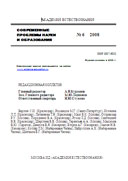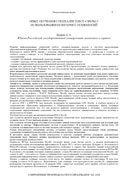PDF-версия статьи


|
At the same time, SMART education opens up new opportunities for teachers: sharing experience and ideas, doing more science, personalizing the course depending on its tasks and competencies of the listener, saving time by modifying the existing content, rather than creating it from scratch. According to the concept of SMART-technologies in education, new characteristics are acquired by a modern training course. It must provide both the quality of education and motivate the student to study.
As a result of the use of SMART-technologies in the educational process:
- the volume of "natural knowledge" in the IT-environment is increasing;
- trainees can get the necessary information more mobile;
- with the introduction of SMART-education, the level of use of innovative technologies increases;
- it is possible to establish cooperation not only within one educational institution, but also the creation of a network for the exchange of information on between various educational institutions, including those located in different countries. The above-described advantages of SMART-technologies in the educational process determine the relevance of the topic of work.
During the past decade, a digital society was actively formed with such attributes as knowledge economy, e-army, e-culture, e-health, e-government, e-science. E-learning is implanted in the structure of the digital society and is its central, backbone element. However, speaking of e-learning, the emphasis was mainly on technology. E-learning is no longer an innovation; there are no unclear positions in it.
Educational content is freely available to students, providing feedback, sharing knowledge between them, automating administrative tasks - this all relates to technology. But what next? What do people do with these technologies, what effect do they get? These questions are already in the context of Smart education. It is the one that is able to provide the highest level of education that meets the challenges and opportunities of today´s world, will allow young people to adapt in a rapidly changing environment, ensure the transition from book content to active.
1. Smart education is an association of educational institutions and professorial teaching staff for joint educational activities on the Internet based on common standards, agreements and technologies. That is, it is about co-creation and use of content, co-education.
2. Smart education - flexibility, with a large number of sources, the maximum variety of multimedia (audio, video, graphics), the ability to quickly and easily adjust to the level and needs of the listener.
In addition, Smart-education should be easily managed, when an educational institution can easily provide the flexibility of the educational process, and integrated, that is, constantly eating external sources.
3. You can also say that smart education, or smart learning, is flexible learning in an interactive educational environment using content from around the world that is freely available. The key to understanding Smart education is the wide availability of knowledge.
4. Smart education is a concept that involves complex
modernization of all educational processes, as well as the methods and technologies used in these processes. Smart in terms of education entails the emergence of technologies such as smart boards, smart screens, Internet access from anywhere. Each of these technologies allows a new way to build the process of developing content, its delivery and updating. Education becomes possible not only in the classroom, but also at home and in any place.
The main element that links the educational process is active educational content, on the basis of which common repositories are created, allowing to remove temporal and spatial frames.
5. Smart-education poses
ОПУБЛИКОВАНО
Tyumebekova L.T., Mombekova S.S., Musirepova E.B., Kalbaeva A.T., Tastanbekova B.O. RESEARCH OF SMART TECHNOLOGIES. // Современные проблемы науки и образования - 2018.-№6. (приложение "Технические науки"). - C. 8